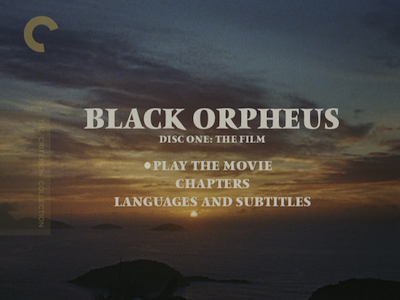
Back when I first started buying DVDs and got into collecting Criterion discs, I used to buy a lot of stuff on eBay. This was when you could actually get a good deal on there, it wasn't just set prices for everything, and I'd bid on whatever Criterions were listed until they hit a certain price. I was getting a bunch of discs that I had never really heard of or knew much about. Though it's hard to piece together now, the original edition of Black Orpheus is the blind buy I remember getting and watching first. Mind = effectively blown.
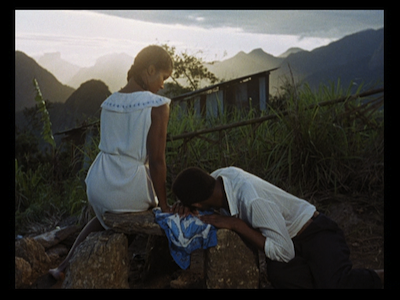
Black Orpheus is a 1959 film by French director Marcel Camus. Based on a play by Vinicius de Moaes, it's a transplanting of the myth of Orpheus and Eurydice from its ancient Greek setting to the modern world of Carnival in Rio de Janeiro. Pulsing with the fevered heartbeat of samba music, provided by the great jazz composer Antonio Carlos Jobim, and full of vibrant costumes, it is a film that establishes its own unreality through sensory overload. Though not technically a musical, Camus draws influences from that classic Hollywood tradition. Like any good example of the genre, Black Orpheus operates simultaneously on two levels: the basic reality of the story and the fantasy of the orchestration. Melody is the key to the magic; on the other side of those doors is a world much like ours, yet totally different.
The basic story is thus: beautiful Euridice (Marpessa Dawn) comes to the city to see her cousin Serafina (Lea Garcia). It's her first time going to Rio, so her first Carnival, but the timing is just a coincidence. Euridice is on the run from a strange dark man (Adhema Ferreira da Silva) who she believes will take her life. Serafina allays her fears: no one can find her, anyone can get lost at the giant party.
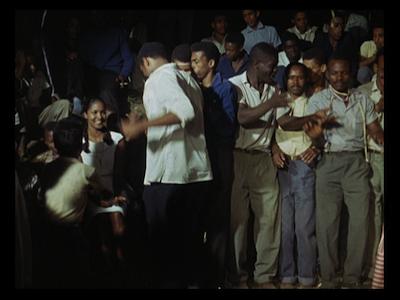
One of the first people Euridice meets is Orfeu (Breno Mello), a streetcar conductor who is also a musician and Serafina's next-door neighbor. Orfeu is the local Casanova, and though most of the ladies nearby claim some kind of love from him, to the pushiest woman goes the spoils. Sexy Mira (Lourdes de Oliveira) has insisted that Orfeu will marry her, and she's even loaned him the money to buy her engagement ring. When they go to get the marriage license, however, the clerk makes a joke and asks if her name is Euridice. He reminds them both that there is an ancient story with Orfeu's namesake, and thus plants the idea of romance in loverboy's head. It's that brief instant of fate that is part of every fairy tale. Just try to get away now, Orfeu!
Fate, of course, is an active agent in any myth. The two standards, sex and death, are inescapable. Thus, the dark man, dressed in a Spider-Man-like Death costume, tracks Euridice down on the same night that she and Orfeu will indulge their passion. You could even say that this Death figure is the cause of it, as Orfeu's need to save her also leads to her surrendering to him. A puritanical reading could also go so far as to suggest that Death is prompting the sin for which he will punish the girl--an ironic and cruel act of the gods. This grimmest of reapers catches up with Euridce again the next day at Carnival. She has taken Serafina's place in the competitive dance, setting her up opposite Mira, whose rage at this discovery reaches epic proportions. Euridice will flee, she will die, and then, as those who have studied the mythology know, Orfeu will have to go down into Hell to see his love again.
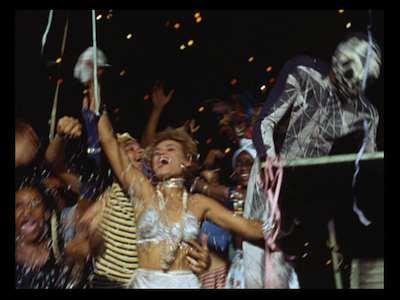
Except instead of the underworld, this Orpheus will have to travel through the back alleys of Rio, traversing the labyrinthine corridors of hospitals and police stations, led by strange sages through odd religious rituals. It's no mere coincidence that the trance that opens the lines of communication with the dead girl is just about equal in terms of spastic beats per minute as the street dancing. Costumed revelers also stand in for the creatures one would expect to meet on the other side.
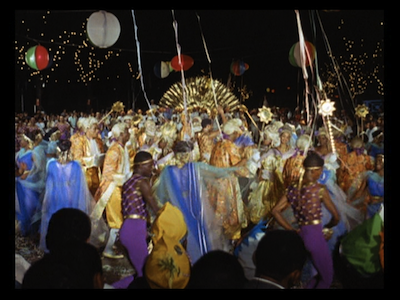
Black Orpheus is a delirious, colorful film. The bright costumes (designed by Isabel Pons), the rainbow graffiti, the clear blues skies and the natural hues of the plants and trees--these wonderful things shine like never before on this new DVD transfer. The Criterion crew has worked tirelessly to bring this heralded classic into the new Hi-Def age. Seeing Black Orpheus in this context actually reminds me of another recent DVD re-release, Powell and Pressburger's The Red Shoes [review]. Only here we have stepped off the stage and the performance is given a practical application on very real streets. Like the less-fake version of West Side Story. Music and mysticism are intertwined.
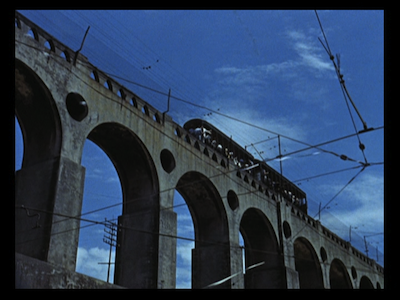
In addition to the compelling narrative, Marcel Camus has given us a rare document of what Carnival was like at the time. Shot in the thick of the action by two cameramen, lead by director of photography Jean Bourgoin, we are put right down in the thick of it, amidst the sweat and the heat and the unstoppable energy of the celebration. Black Orpheus also has elements of a travelogue. Here is a chance to see Brazil as it was fifty years ago. Rio is a city with spectacular architecture, both large and small, and since Camus shot on location, it's preserved for all time.
The narrative of Black Orpheus rolls by like a fairy tale should. There isn't much pausing for pontification, and thanks to the music, even very little silence. It's a movie of extremes, operatic in its emotions. For all the joy of the festival and the temperature of the lovers' ardor, there is also the deep lows of jealousy, heartbreak, and death. Fate deals a heavy hand, after all, and the price you pay is proportional to the pleasure it purchases. So too can Black Orpheus leave you feeling breathless, exhausted from the dance, but more alive for having jumped into it.

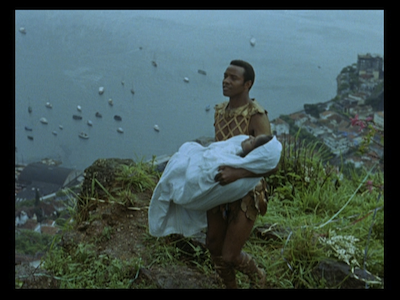
As noted above, this new edition of Black Orpheus is a restored edition, replacing a DVD that is now more than ten years old. The clean-up here is magnificent, and in addition to a new transfer, Criterion has added a full disc of extras to what was previously a bare-bones release. The second disc has a bunch of interviews, including archival selections with Marcel Camus and Marpessa Dawn. Newer pieces from scholars and historians shed light on the history of the project and the traditions it draws from, including a segment about bossa nova music by jazz expert Gary Giddins.
Most substantial, however, is a 90-minute 2005 documentary Looking for "Black Orpheus", directed by Rene Letzgus and Bernard Tournois, which includes a look back from actors Breno Mello ("Orfeu") and Lea Garcia ("Serafina") and Marcel Camus' assistant director Silvio Autuori. Film fans will immediately perk up when they see the documentary starts with newsreel footage from the 1959 Cannes film festival (Brigitte Bardot! Romy Schneider! Alain Delon!), and Criterion fans will appreciate the participation of contemporary Brazilian musician Seu Jorge, best known for his David Bowie covers in The Life Aquatic with Steve Zissou [review]. This expansive look at the production asks where the film came from and what it means today.

In short, the 2010 reissue of Black Orpheus is an essential upgrade. Yes, I know double-dips are often dreaded, but given the length of time in between, technology is vastly different now than it was a decade ago. Like the Powell & Pressburger discs last month, Black Orpheus is also available on Blu-ray
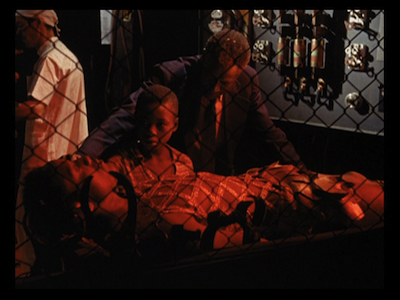
This disc was provided by the Criterion Collection for purposes of review.

4 comments:
The last Criterion disc I bought without checking it out first was "Sweet Movie", and I will never make a blind purchase again. However, I will say my mind was blown - just not in a good way.
Last night I saw the theatrical release of a newly restored Black Orpheus, and what a magnificent experience it was! Good as a DVD might be, seeing it in a theather is untouchable. Love it!
For the films costume designs there is not one listed in IMBD I tried searching other sources but ran into a dead end. My question is was there an actual costume designer assigned to the crew but was not listed in the credits? Or were the costumes outsourced and purchased for the film?
I have the same question Chef_harding asked. The costume designer is unnamed. Only production designer Pierre Guffroy is listed. When I looked up Isabel Pons, I found a French artist of the same name. Her career would fit in the time period of the film. By chance, is the Pons mentioned here on the blog the same artist?
Thanks.
Post a Comment